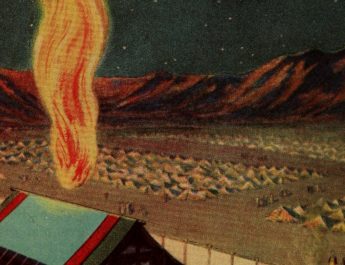Matthew 27:50-56
All Saints’ Day – A Women’s Lectionary
50 Then JesusA criedB again with a loudC voiceD and breathed his last.E
A “Jesus” = Iesous. From Hebrew Yehoshua (Joshua, the Lord is salvation); {from YHVH (proper name of the God of Israel; the self-existent and eternal one); {from havah (to become) or from hayah (to come to pass, become, be)} + yasha (to deliver, defend, help, preserve, rescue; properly, to be open, wide or free, which implies being safe. So, in a causative sense, this is to free someone)}. This is Jesus or Joshua in Greek – the Lord saves or the Lord is salvation.
B “cried” = krazo. This is to cry out, scream, shriek. It is onomatopoeia for the sound of a raven’s call. Figuratively, this means crying out urgently without intelligible words to express something that is deeply felt.
C “loud” = megas. This is big in a literal or figurative sense – great, large, exceeding, abundant, high, mighty, perfect, strong, etc.
D “voice” = phone. Probably from phemi (to declare, say, use contrasts in speaking to shed light on one point of view); {from phao (to shine) or phaino (to bring light, cause to appear, shine, become visible or clear). This is a voice, sound, tone or noise. It can also be a language or dialect.
E “breathed his last” = aphiemi + ho + pneuma. Could be “yielded up his spirit” or “released his breath.” Aphiemi is from apo (from, away from) + hiemi (to send). This is send away, release, permit, forgive, allow to depart, discharge, or send forth. Pneuma is from pneo (to blow, breathe, breathe hard). This is wind, breath, or ghost. A breeze or a blast or air, a breath. Figuratively used for a spirit, the human soul or part of us that is rational. It is also used supernaturally for angels, demons, God, and the Holy Spirit. This is where pneumonia comes from.
51 FAt that moment the curtainG of the templeH
F {untranslated} = idou. From eido (to be aware, see, know, remember, appreciate). This is see! Lo! Behold! Look! Used to express surprise and or draw attention to the statement.
G “curtain” = katapetasma. 6x in NT. From kata (down, against, throughout, among) + petannumi (to spread out). This is the inner veil in the Temple. Literally, it is what spreads down i.e. hangs down. The curtain hung between the Holy of Holies, the innermost part of the Temple, from the rest of it.
H “temple” = naos. From naio (to dwell, inhabit). This is a place for God (or a god) to live – a sanctuary, shrine, or temple. It is a place for God or a god to manifest. For the Jewish Temple, it is used of the Temple itself and the two inner chambers.
was tornI in two,J from topK to bottom.L
I “torn” = schizo. 11x in NT. This is to split, divide, tear, sever; split in a literal or figurative sense. This is where the word “schism” comes from and also “schizophrenia” (literally “split mind”).
J “two” = duo. This is two or both.
K “top” = anothen. 13x in NT– this is the word used in John 3:3 in the being born “from above”/“again” conversation between Jesus and Nicodemus. From ano (up, above, up to the top, things above, heaven); from ana (up, upwards, again, back, among, anew). This is from above, from the top, again, beginning, from the source. It implies anew.
L “bottom” = kato. 10x in NT. From kata (down, against, throughout, among). This is down, below, lower, bottom, under.
The earthM shook,N and the rocksO were split.P
M “earth” = ge. This is earth, land, soil, region, country, the inhabitants of an area.
N “shook” = seio. 5x in NT. This is shake, move, or quake. Properly, it is shaking back and forth. Figuratively, it can mean to agitate or to cause people to have tremors of fear or worry.
O “rocks” = petra. 15x in NT. This is large rock that is connected and or projecting like a rock, ledge, or cliff. It can also be cave or stony ground.
P “split” = schizo. Same as “torn” in v51. See note I above.
52 The tombsQ also were opened,R and manyS bodiesT
Q “tombs” = mnemeion. From mousikos (to remember); from mneme (memory or mention); from mnaomai (to remember; by implication give reward or consequence); perhaps from meno (to stay, abide, wait, endure). This is properly a memorial – a tomb, grave, monument.
R “opened” = anoigo. From ana (up, back, again, among, between, anew) + oigo (to open). This is to open in literal or figurative sense.
S “many” = polus. This is much, often, plenteous – a large number or a great extent.
T “bodies” = soma. Perhaps from sozo (to save, heal, rescue); from sos (safe, well, rescued). This is body or flesh. It can be body in a literal or figurative sense (as the body of Christ). This is where the word “somatic” comes from.
of the saintsU who had fallen asleepV were raised.W
U “saints” = hagios. From hagnos (holy, sacred, pure ethically, ritually, or ceremonially; prepared for worship, chaste, unadulterated, pure to the core; undefiled by sin; figurative for innocent, modest, perfect). God is totally different from humanity and thus set apart. That which is consecrated to worship God (elements of worship) or to serve God (as the saints) are holy because they are now set apart for God’s purposes. Holy because important to God. This is sacred physically, pure. It can be morally blameless or ceremonially consecrated.
V “fallen asleep” = koimao. 18x in NT. From keimai (to lie, recline, set, be appointed, be destined). This is to sleep or put to sleep. Figuratively, it can mean to die. In the New Testament, it is used 15x for death and 3x for sleep.
W “raised” = egeiro. This is to awake, raise up or lift up. It can be to get up from sitting or lying down, to get up from sleeping, to rise from a disease or from death. Figuratively, it can be rising from inactivity or from ruins.
53 After his resurrectionX they cameY out of the tombs and enteredZ the holyAA cityBB and appearedCC to many.
X “resurrection” = egersis. Related to “raised”’ in v52. 1x in NT. From egeiro (see note W above). This is a waking up or resurrection.
Y “came” = exerchomai. From ek (from, from out of) + erchomai (to come, go). This is to go out, depart, escape, proceed from, spread news abroad.
Z “entered” = eiserchomai. Related to “came” in v53. From eis (to, into, for, among) + erchomai (see note Y above). This is to go in in a literal or figurative sense.
AA “holy” = hagios. Same as “saints” in v52. See note U above.
BB “city” = polis. This is a city or its inhabitants. It is a town of variable size, but one that has walls. This is where “metropolis” and “police” come from.
CC “appeared” = emphanizo. Related to “voice” in v50. 10x in NT. From emphanes (visible, apparent, openly, understood); {from en (in, on, at, by, with) + phaino (see note D above)}. This is to declare, make visible, or exhibit in person. It can also be to report against or notify.
54 Now when the centurionDD and those with him, who were keeping watch overEE Jesus, sawFF the earthquakeGG
DD “centurion” = hekatontarches. From hekaton (hundred) + archo (to rule, begin, have first rank or have political power). This is a centurion from the Roman army, leader a captain of one hundred soldiers.
EE “keeping watch over” = tereo. From teros (a guard or a watch that guards keep); perhaps related to theoreo (gazing, beholding, experiencing, discerning; looking at something to analyze it and concentrate on what it means; the root of the word “theatre” in that people concentrate on the action of the play to understand its meaning); from theaomai (to behold, look upon, see, contemplate, visit); from thaomai (to gaze at a spectacle; to look at or contemplate as a spectator; to interpret something in efforts to grasp its significance); from theoros (a spectator or envoy). This is to guard, observe, keep, maintain, or preserve. It can also be used figuratively for spiritual watchfulness. It is guarding something from being lost or harmed – keeping an eye on it. Contrast the Greek phulasso, which is to guard something so that it doesn’t escape. Also contrast koustodia, which generally denotes a fortress or military presence. This word can mean fulfilling commands, keeping in custody, or maintaining. It can also figuratively mean to remain unmarried.
FF “saw” = horao. To see, perceive, attend to, look upon, experience. Properly, to stare at and so implying clear discernment. This, by extension, would indicate attending to what was seen and learned. This is to see, often with a metaphorical sense. Can include inward spiritual seeing.
GG “earthquake” = seismos. Related to “shook” in v51. 14x in NT. From seio (see note N above). This is a commotion or shaking generally. It can also be a storm or earthquake. This is where “seismic” comes from.
and what took place,HH they were terrifiedII and said, “TrulyJJ this man was God’sKK Son!”LL
HH “took place” = ginomai. This is to come into being, to happen, become, be born. It can be to emerge from one state or condition to another or is coming into being with the sense of movement or growth.
II “terrified” = phobeo + sphodra. Phobeo is from phobos (panic flight, fear, fear being caused, terror, alarm, that which causes fear, reverence, respect); from phebomai (to flee, withdraw, be put to flight). This is also to put to flight, terrify, frighten, dread, reverence, to withdraw or avoid. It is sometimes used in a positive sense to mean the fear of the Lord, echoing Old Testament language. More commonly, it is fear of following God’s path. This is where the word phobia comes from. Sphodra is 11x in NT. From sphodros (exceeding, very much, all out, violent). This is exceedingly, greatly, deeply. This is going all out, with total effort, done to the fullest extent.
JJ “truly” = alethos. 18x in NT. From alethes (true, unconcealed; true because it is in concert with fact and reality – attested. Literally, what cannot be hidden; truth stands up to test and scrutiny and is undeniable, authentic); from a (not) + lanthano (concealed, hidden, unnoticed; to shut one’s eyes to, unwittingly, unawares). This is truly, really, surely, truthfully, indeed. Properly, this is saying “in accordance with fact…” – what one is about to say can be proven and is true to reality.
KK “God’s” = Theos. From Proto-Indo-European origins, meaning do, put, place. This is God or a god in general.
LL “Son” = huios. This is son, descendant – a son whether natural born or adopted. It can be used figuratively for other forms of kinship.
55 Many womenMM were also there, looking onNN from a distance; they had followedOO Jesus from Galilee,PP ministeringQQ to him.
MM “women” = gune. Related to “took place” in v54. Perhaps from ginomai (see note HH above). This is woman, wife, or bride. This is where the word “gynecologist” comes from.
NN “looking on” = theoreo. Related to “keeping watch over” in v54. See note EE above.
OO “followed” = akoloutheo. From a (with, fellowship, union) + keleuthos (road, way). This is to accompany or follow someone, especially the way a disciple does.
PP “Galilee” = Galilaia. From Hebrew galil (cylinder, circuit, district); from galal (to roll in a literal or figurative sense, roll away, roll down, wallow, remove, trust). This is Galilee, meaning perhaps region or cylinder.
QQ “ministering” = diakoneo. From diakonos (servant, minister, waiter, or attendant; a person who performs a service, including religious service); {perhaps from dia (through, across to the other side, thoroughly) + konis (dust) OR from dioko (to chase after, put to flight; by implication, to persecute or to purse like a hunter after its prey; this can be earnestly pursue or zealously persecute); {related to dio (put to flight)}}. This is to wait at table, to serve generally, to minister or administer, to be in the office of deacon. To wait on someone as a slave, friend, or host.
56 Among them were MaryRR Magdalene,SS and Mary the motherTT
RR “Mary” = Maria. From Hebrew Miryam (Aaron and Moses’s sister); from marah (to be contentious, rebellious, bitter, provoking, disobedient; to be or make bitter or unpleasant; figuratively, to rebel or resist; causatively to provoke). This is Miriam or Mary.
SS “Magdalene” = Magdalene. 12x in NT. From Magdala (Magadan, a place near the Sea of Galilee); perhaps from Aramaic migdal, see also Hebrew migdal (tower); from gadal (to grow, grow up, be great). This is from Magdala.
TT “mother” = meter. This is mother in a literal or figurative sense.
of JamesUU and Joseph,VV and the mother of the sons of Zebedee.WW
UU “James” = Iakobus. From the same as Iakob (Jacob); from Hebrew Yaaqob (Jacob; “heel-catcher” or “supplanter”); from the same as aqeb (heel, hind part, hoof, rear guard of an army, one who lies in wait, usurper). This is Jacob, meaning “heel-catcher” or “supplanter.”
VV “Joseph” = Ioseph. From Hebrew Yoseph (he increases; Joseph); from yasaph (to add, increase, continue, exceed). This is Joseph, meaning “he increases.”
WW “Zebedee” = Zebedaios. Related to “Jesus” in v50. 12x in NT. From Hebrew zebadyah (Zebadiah, “The Lord has bestowed”); {from Zabad (to bestow, confer, endure) + Yah (God, the Lord; a shortening of the sacred name of the God of Israel); {from YHVH (see note A above)}. This is Zebedee, meaning “the Lord has bestowed.”
Image credit: “Jesus at the Passover – Part 2” by Lars-Goran Ronnberg.




